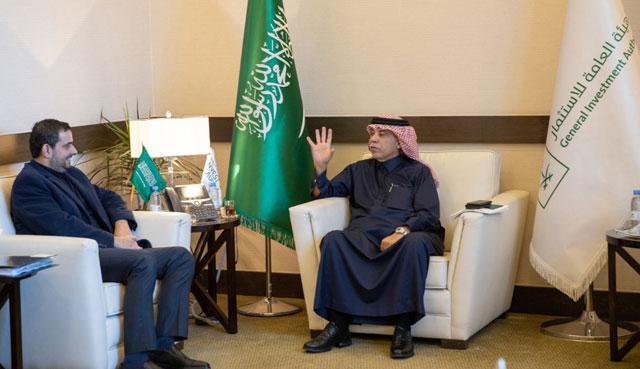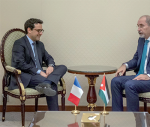You are here
Jordanian-Saudi joint committee addresses private sector woes
By JT - Dec 24,2019 - Last updated at Dec 24,2019

The Jordanian-Saudi joint committee concluded its 16th session on Monday covering a wide array of mutual issues (Petra photo)
AMMAN — The Jordanian-Saudi joint committee on Monday concluded its 16th session, which was held recently in Riyadh to discuss commercial, industrial, investment and financial cooperation between the two kingdoms.
The session, which was headed by Minister of Industry and Trade Tariq Hammouri on the Jordanian side and Minister of Transport Saleh Bin Nasser Al Jasser on the Saudi side, also covered cooperation in the fields of health and medicine, the Jordan News Agency, Petra, reported.
Additionally, the session addressed cooperation in transportation, agriculture, energy, education, higher education, public works, housing, information, social development, culture and environment. The two sides also discussed cooperation between the countries' private sectors.
The Ministry of Industry said in statement that the committee reached "practical solutions" to the difficulties facing both countries' private sectors and mechanisms were agreed upon to resolve them as soon as possible.
The statement said that it was agreed upon to provide Saudi Arabia with investment opportunities in the Kingdom and to find mechanisms to encourage and facilitate Saudi investment in Jordan.
The statement said that the aim is to activate mutual investment and accelerate the completion of an executive programme designed to promote cooperation in the field of investment between the Saudi Arabian General Investment Authority and the Jordan Investment Commission (JIC) for the years 2020-2022.
The two sides also agreed to hold an exhibition of Saudi industries in Jordan, and an exhibition of Jordanian industries in Saudi Arabia.
Saudi Arabia is Jordan's largest commercial partner, with a trade exchange volume of $4.1 billion in 2018, which marked an increase of 14.7 per cent when compared with 2017.
The value of exports to Saudi Arabia during 2018 amounted to $711.5 million, while the value of imports reached $3.4 billion in the same year.
The volume of trade exchange during the first nine months of 2019 amounted to around $3 billion, while the value of exports amounted to $570.5 million and the value of imports reached $2.5 billion.
Saudi Arabia maintains one of the highest rates of investment in the Kingdom, with a value exceeding $12 billion in the transportation, infrastructure, energy, financial, commercial, tourism and construction sectors.
Direct Saudi investments in Jordan that benefit from the investment promotion law amounted to about $1.83 billion at the end of 2018 distributed over the services, agriculture, services and industry sectors.
Additionally, there are Saudi investments exceeding $2.1 billion in the Aqaba Special Economic Zone, mostly in the tourism construction sector.
Saudi investments in the Kingdom have contributed to the national economy through its focus on investments that provide employment opportunities for Jordanians.
In the customs field, it was agreed to solve issues that hinder the movement of trade exchange between the two countries.
The ministry said that the joint committee agreed to continue to allow qualified Jordanian medical personnel to work in Saudi Arabia, and to allow qualified Jordanian family medicine trainers to train workers in the family medicine programme in Saudi Arabia.
In the fields of food and pharmaceuticals, Jordan agreed to proceed with easing restrictions imposed on imported Saudi dairy products that conform to specifications.
Saudi Arabia also expressed its intent to re-evaluate the Jordan Food and Drug Administration and consider authorising it to accredit companies, allowing them to export food products from Jordan.
The two countries also agreed to update the “programme for mutual recognition of conformity certificates and quality labels for products” signed between the two countries.
Additionally, they agreed to implement the memorandum of understanding in the field of labour signed between the two countries in 2015 by activating the executive programme signed in the same year.
Related Articles
AMMAN — The Jordanian-Saudi Joint Committee, headed by Jordanian Minister of Industry and Trade Yousef Shamali and Saudi Minister of Transpo
AMMAN — The Jordan Chamber of Commerce (JCC) is scheduled to hold the activities of the Jordanian-Saudi economic forum and the eighth m
AMMAN — The Jordan Chamber of Commerce (JCC), in cooperation with the Council of Saudi Chambers (CSC), is scheduled to organise a Jordanian-














